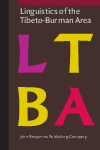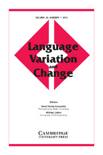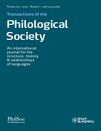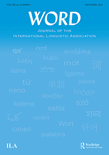
Hrvatski Dijalektoloski Zbornik
metrics 2024
Fostering Dialogue in Linguistic Diversity
Introduction
Hrvatski Dijalektoloski Zbornik is an esteemed academic journal dedicated to the field of Dialectology and Linguistic Research, published by the Croatian Academy of Sciences and Arts, Department of Linguistic Research. With an Open Access policy established since 2015, the journal aims to promote the dissemination of research findings and encourage scholarly exchange among linguists and dialectologists. The journal has achieved recognition in the field, ranking in the Q3 category for Linguistics and Language in 2023, and its impact can be further gauged through its Scopus rankings, positioning it favorably within both the Arts and Humanities and Social Sciences categories. As it converged its publication years from 2017 to 2023, the journal continues to showcase rigorous research from various dialectical studies, contributing significantly to the understanding of language variation and evolution in Croatia and beyond. Researchers, professionals, and students alike are encouraged to explore the rich compendium of linguistic scholarship that this journal offers.
Metrics 2024
 0.12
0.12 0.20
0.20 0.10
0.10 3
3Metrics History
Rank 2024
Scopus
JCI (Web Of Science)
Quartile History
Similar Journals

Linguistics of the Tibeto-Burman Area
Advancing Knowledge in Tibeto-Burman Language StudiesLinguistics of the Tibeto-Burman Area is a premier journal dedicated to the study and exploration of the Tibeto-Burman languages, offering a significant platform for researchers, scholars, and practitioners in the field of linguistics. Published by John Benjamins Publishing Co, this journal not only maintains rigorous scholarly standards but also aims to contribute to the understanding of language diversity and evolution within the Tibeto-Burman region. With an impressive Q2 ranking in linguistics and language, it ranks in the 49th percentile within Arts and Humanities and the 45th percentile in Social Sciences, highlighting its relevance and quality in the academic community. Since its inception in 2011, the journal has been at the forefront of disseminating research that encourages interdisciplinary dialogue and fosters insights into language structure, use, and cultural implications. Though not an open access publication, it remains accessible to institutions and individuals alike, ensuring that vital academic discussions continue. The ISSN for print is 0731-3500 and for the electronic version, 2214-5907, facilitating the work of the growing scholarly community engaged in Tibeto-Burman linguistics.

Dacoromania
Unlocking innovative research for a global audience.Dacoromania, published by the esteemed EDITURA ACAD ROMANE, is an Open Access academic journal that has been contributing to the fields of Linguistics, Language, Literature, and Literary Theory since 2011. With a mission to foster scholarly dialogue and facilitate knowledge dissemination, the journal enables researchers, professionals, and students to access a wealth of innovative research and critical scholarship without barriers. Although currently classified in the Q4 quartile for its categories in Linguistics and Literature, Dacoromania aspires to enhance its visibility and impact within these disciplines, providing a platform for emerging voices and ideas from Romania and beyond. The journal is openly accessible and invites submissions that push the boundaries of linguistic and literary studies, ensuring a vibrant exchange of thought in a rapidly evolving academic landscape.

SKASE Journal of Theoretical Linguistics
Fostering Collaboration in Theoretical LinguisticsSKASE Journal of Theoretical Linguistics, published by the SLOVAK ASSOCIATION STUDY ENGLISH-SKASE, is a distinguished Open Access journal that expands the horizons of linguistic research and theoretical frameworks. With its ISSN N/A and E-ISSN 1336-782X, the journal has established itself as a pivotal resource for scholars in the field, achieving a commendable Q2 ranking in Linguistics and Language as of 2023. The journal, which has been in continuous publication since 2017, actively publishes innovative research studies, reviews, and theoretical discussions, easing access to groundbreaking work for academics and practitioners alike. Based in Slovakia, it connects a rich heritage of linguistic scholarship and is indexed in Scopus, ranking alongside its peers in both Arts and Humanities and Social Sciences categories. The SKASE Journal of Theoretical Linguistics is crucial for anyone interested in the evolving landscapes of linguistics, serving as an invaluable platform for disseminating knowledge and fostering collaboration amongst researchers worldwide.

Language Variation and Change
Advancing Insights in Sociolinguistic ResearchWelcome to Language Variation and Change, a prestigious journal published by Cambridge University Press and dedicated to the rigorous exploration of linguistic diversity and its evolution. With an ISSN of 0954-3945 and an E-ISSN of 1469-8021, this journal has been a pivotal platform for scholars since its inception in 1989, continuing to publish cutting-edge research up to 2024. Language Variation and Change is recognized in the top quartile for Linguistics and Language (Q1) and holds an impressive Q2 ranking in Education for 2023, underscoring its significant contribution to these fields. Its strong Scopus rankings—placing it in the 86th percentile for Arts and Humanities in Language and Linguistics—highlight its impact and quality. This journal aims to foster a deeper understanding of the dynamic interplay between language and society, making it essential reading for researchers, professionals, and students eager to engage with the latest findings and theoretical discussions in the arena of sociolinguistics. Stay connected with the evolving landscape of language studies through Language Variation and Change.

Voprosy Leksikografii-Russian Journal of Lexicography
Innovative Perspectives on Lexicographic ResearchVoprosy Leksikografii-Russian Journal of Lexicography, published by TOMSK STATE UNIVERSITY, is a premier journal dedicated to advancing the field of lexicography and linguistics. With an ISSN of 2227-4200 and E-ISSN 2311-3758, this journal has established itself as a vital resource for researchers and practitioners in the discipline. As a recognized Q1 journal in Linguistics and Language (2023), it ranks impressively in the Scopus database, placing within the top percentile of both Arts and Humanities and Social Sciences categories. The journal aims to promote scholarly discourse through rigorous research, innovative methodologies, and the exploration of contemporary issues in lexicography. Despite not being open access, it remains pivotal for anyone engaged in linguistic studies, providing essential insights and fostering academic collaboration in the Russian Federation and beyond. For emerging scholars and seasoned experts alike, Voprosy Leksikografii serves as an indispensable platform for disseminating high-quality research in the rapidly evolving landscape of language studies.

Euskera
Exploring the Depths of Basque Language and CultureEuskera is a distinguished academic journal dedicated to the study and promotion of the Basque language and culture, published by EUSKALTZAINDIA, the Royal Academy of the Basque Language. With the ISSN 0210-1564, this journal serves as a pivotal platform for researchers, linguists, and cultural scholars to disseminate cutting-edge research and discussions focused on linguistics, language preservation, and Basque identity. Although the journal is not classified as Open Access, it provides comprehensive insights into the advancement of Basque studies and contributes significantly to the field’s academic discourse. Aimed at fostering a deeper understanding and appreciation of the linguistic and cultural heritage of the Basque people, Euskera plays an invaluable role in connecting scholars and practitioners, promoting vibrant scholarly exchanges that enrich both local and global perspectives.

Jezikoslovlje
Elevating Understanding Through Rigorous Linguistic InquiryJezikoslovlje, published by the Josip Juraj Strossmayer University, Faculty of Philosophy in Croatia, is an essential publication in the field of Linguistics and Language Studies. Launched in 2008 and extending its contributions to the academic community through 2024, this journal addresses a spectrum of linguistic research, facilitating scholarly dialogue around both theoretical and applied aspects of language. With a current Scopus ranking placing it in the 54th percentile in the Arts and Humanities and the 50th percentile in Social Sciences, Jezikoslovlje serves as a vital resource for researchers and students looking to engage with contemporary linguistic issues. Although it operates under a traditional access model, its indexed presence and rigorous peer-review process ensure that published works maintain a high scholarly standard, inviting contributions that advance understanding in this dynamic discipline. The journal's commitment to fostering knowledge in linguistics makes it a significant platform for academics in Croatia and beyond.

TRANSACTIONS OF THE PHILOLOGICAL SOCIETY
Exploring the Depths of Linguistic KnowledgeTRANSACTIONS OF THE PHILOLOGICAL SOCIETY, published by Wiley, is a prestigious journal focusing on the fields of linguistics and language studies. With a rich history that spans over 180 years, having been established in 1842, this journal continues to contribute significantly to the academic discourse on language and linguistics. It holds an impressive impact factor and ranks in the Q2 category for both Linguistics and Language in the 2023 category quartiles, underscoring its relevance and scholarly influence, as evidenced by its rankings in the Scopus database. Researchers, professionals, and students will find this journal invaluable for accessing high-quality research articles that illuminate various aspects of language and linguistics. While the journal does not currently offer open access, it remains a vital resource for anyone dedicated to advancing knowledge in these fields. Its address in the United Kingdom underscores its international reach and commitment to academic excellence.

WORD-JOURNAL OF THE INTERNATIONAL LINGUISTIC ASSOCIATION
Uncovering insights that shape the future of linguistics.WORD-JOURNAL OF THE INTERNATIONAL LINGUISTIC ASSOCIATION is a leading peer-reviewed journal dedicated to advancing the field of linguistics and language studies. Published by Routledge Journals, Taylor & Francis Ltd, this esteemed journal has earned a reputation for its rigorous scholarship, reflected in its 2023 Q2 ranking in Linguistics and Language and its solid performance in Scopus Ranks. Encompassing a wide range of topics—from theoretical frameworks to empirical research—WORD serves as an essential resource for linguistics researchers, educators, and students alike. While currently not operating under an open access model, the journal is committed to providing high-quality, impactful research articles that contribute significantly to the linguistic community. With its convergence periods from 1998 to 2009 and 2015 to 2024, WORD continuously fosters the discourse of language studies, ensuring that critical insights and discussions are accessible for ongoing academic exploration.

Dialectologia
Championing Open Access to Language ScholarshipDialectologia, published by the Universidad de Barcelona, Facultad de Filología, is a distinguished academic journal dedicated to the fields of linguistics and language studies. Since its inception in 2008, this Open Access journal has made significant strides in disseminating knowledge, fostering scholarly communication, and promoting research in dialectology and sociolinguistics. With its current classification in the Q3 quartile of linguistics and language, and Scopus rankings placing it in the 32nd and 29th percentiles within the Arts and Humanities and Social Sciences, respectively, Dialectologia plays a crucial role in advancing the study of language variation and change. The journal’s commitment to providing a platform for innovative research is underscored by its accessibility to a wide audience, ensuring that researchers, professionals, and students alike can engage with and contribute to contemporary discourse in language studies. Based in Barcelona, Spain, Dialectologia not only enriches academic literature but also connects a global community of language scholars through its compelling and diverse contributions.